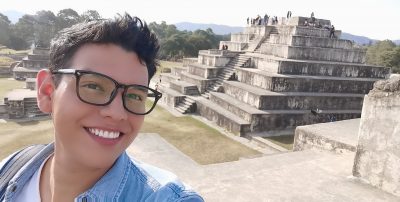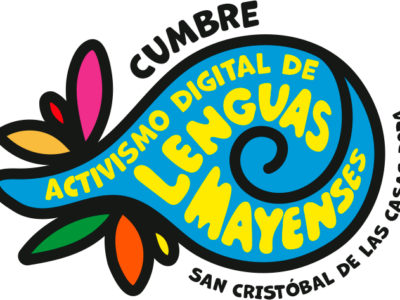
Photograph shared by Héctor Josué Martínez Flores
In 2020, we continue our social media campaign by inviting different hosts to manage the @ActLenguas (Language Activism) Twitter account and share their experiences with the revitalization of and advocacy for native languages. This profile post is about Héctor Josué Martínez Flores (@hecjos15) and what he plans to discuss during his week as a host.
Rising Voices (RV): Please tell us about yourself.
Mi nombre es Héctor Josué Martínez Flores y soy de El Salvador, actualmente me desempeño como docente de educación básica y soy uno de los 70 docentes especistas en náhuat e identidad cultural, de mi país, certificado por el Ministerio de Educación de El Salvador.
Debido a la falta de interés del estado hacia este tema decidí tomar la iniciativa de crear un canal de YouTube y una Página, llamada “TIMUMACHTIKAN NAWAT”, para documentar lo más que se pueda mi lengua, pues estamos contra el tiempo, ya que el náhuat es la última lengua indígena viva del país y posee muy pocos hablantes.
Con mi iniciativa he documento conocimientos ancestrales con la ayuda de las nahuahablantes más ancianas, datos que no se encuentran en ninguna otra página o libro, pues como repito, las lenguas indígenas en mi país, nunca han sido tomadas como un objeto de estudio, ni nada serio y mi preocupación más grande es que el náhuat desaparezca, al igual que desaprecio el Lenca, el kakawira y otras lenguas mayas que se hablaban en El Salvador, sin tan siquiera dejar mayor registro de ellas.
Por lo que con mi iniciativa intento documentar la lengua náhuat en internet, ya que de esta forma me estoy asegurando de que llegue a más personas y permanezca en línea por si algún día, llegase a desaparecer la lengua.
En mi página y canal encontraran datos que no habían sido registrados jamás, como, por ejemplo: el nombre del número “mil” en náhuat, la división en la aritmética náhuat, y he realizado comparaciones de las otras operaciones aritméticas básicas que ya estaban registradas para confirmar o negar su veracidad; también he registrado muchos neologismos (escolares y cotidianos) que utilizan los ancianos en la comunidad.
Además de eso, con mi iniciativa pretendo llamar la atención de los jóvenes para crear nuevos hablantes y revitalizar la lengua, para ello he creado contenido juvenil, como memes y videos graciosos en náhuat, videos con lecciones completas en náhuat, para el aprendizaje sistemático de la lengua, también todos los días se sube un vídeo corto que contiene frases o palabras del día, que sirven para repasar o aprender al menos una frase o palabra útil al día y recientemente se están creando actividades colectivas para la visibilización de la lengua náhuat.
Cabe aclarar que el proyecto lo estoy ejecutando de manera individual, pues soy yo quien autofinancia, graba, edita, traslada y publica todo el contenido de mis sitios.
My name is Héctor Josué Martínez Flores and I am from El Salvador. I currently work as a teacher of primary education and I am one of 70 teachers from my country specialized in Nawat language and cultural identity, and certified by the Ministry of Education in El Salvador.
Due to the lack of interest from the state for this issue, I decided to take the initiative to create a YouTube channel and a webpage called “TIMUMACHTIKAN NAWAT”, in order to document my language as much as possible. This is an urgent issue because Nawat is the last living indigenous language in the country and has very few speakers.
I have documented ancestral knowledge with the help of the oldest Nawat speakers, and this data is not found on any other webpage or in books, because the indigenous languages in my country have never been studied. My biggest concern is that Nawat will disappear (as it was the case with Lenca, Kakawira and other Mayan languages spoken in El Salvador), without even being recorded.
So, with my initiative I try to document the Nawat language on the Internet, and in this way, I am making sure that it reaches more people and remains online in case one day the language disappears.
My webpage and YouTube channel contain data that had never been recorded, such as the name of the number “thousand” in Nawat, and the division in Nawat arithmetic (and I have made comparisons with the other basic arithmetic operations that were already registered to verify its truthfulness). I have also recorded many neologisms (from academic and everyday language) used by the elderly in the community.
Also, I intend to draw the attention of the young people so they become new Nawat speakers and in this way to revitalize the language. So, I have created content especially for the youth, such as funny memes and videos in Nawat, videos with lessons completely in Nawat, for the systematic learning of the language. Also, I upload a short video where people can review or learn at least one useful phrase or word a day. Recently, I also create group activities to enhance the visibility of the Nawat language.
I should clarify that I run this project by myself, and this means that I finance, record, edit, translate and publish all content of my websites.
RV: What is the current status of your language on the internet and offline?
Lastimosamente el estado actual de la lengua en mi país no es muy buena, pues según el último censo poblacional, realizado en el 2007, en aquel tiempo solo existían 200 nahuahablantes, por lo que la cifra 13 años después, es mucho más alarmante, pues todos los hablantes son adultos de edad avanzada y ese número va decreciendo con los días.
En internet es muy escaso el material que existe de la lengua náhuat, es más, cuando escribimos “náhuat” en internet, pasan dos cosas muy curiosas, número uno: nos corrige y número dos: solamente muestra resultados de la lengua “náhuatl”, que es otra lengua distinta a la hablada en El Salvador y aunque ambas son lenguas muy similares, ya que comparten una misma raíz lingüística, son dos lenguas diferentes.
Por lo que con mi iniciativa estoy visibilizando la lengua náhuat y poniéndola en el “mapa digital”, de la red.
Unfortunately, the current state of the language in my country is not very good, because, according to the last population census carried out in 2007, at that time there were only 200 Nawat speakers. Now, 13 years later, the situation is much more alarming, because all speakers are elders, so their number decreases every day.
The online material in the Nawat language is very scarce. Moreover, when we search “Nawat” on the internet, two very curious things happen: it corrects us and it only shows results for the “Nahuatl” language, which is a language different from that spoken in El Salvador (although they are very similar since they share the same linguistic root).
So, my initiative makes the Nawat language visible by putting it on the “digital map”.
RV: On what topics do you plan to focus during the week that you’ll manage the @ActLenguas Twitter account?
Principalmente quiero compartir más información sobre mi lengua y compartir algún material audiovisual del trabajo que estoy realizando.
I mainly want to share more information and audiovisual material about my language.
RV: What are the main motivations for your digital activism for your language? What are your hopes and dreams for your language?
Mi motivación es crear nuevos hablantes de la lengua náhuat y poder seguir documentando la lengua lo más que pueda.
Mi sueño ideal sería que en El Salvador se creara una conciencia colectiva para que logremos revitalizar la lengua náhuat.
My motivation is to create new speakers of the Nawat language and to be able to continue documenting the language as much as I can.
My dream would be for all the people in El Salvador to be aware of the situation of the Nawat language so that we all can revitalize it.



